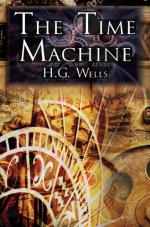|
This section contains 5,397 words (approx. 18 pages at 300 words per page) |

|
SOURCE: Begiebing, Robert J. “The Mythic Hero in H. G. Wells's The Time Machine.” Essays in Literature 11, no. 2 (fall 1984): 201-10.
In the following essay, Begiebing discusses the Time Traveller as the archetype of the mythic hero.
In 1915 Van Wyck Brooks hinted at an important quality of H. G. Wells's vision when he said that the author's intelligence is “exuberant” with a “very genuine religious instinct” that Wells “lavished” upon “the social process itself.” And in 1922 and 1946 two foreign writers, Evgeny Zamyatin and Jorge Luis Borges, commented on Wells's timeless symbolic processes and mythmaking. But it was in the 1960's that critics began to focus on the archetypal dimensions of Wells's “scientific romances.” Bernard Bergonzi argued in 1960 and 1961 that Wells's early fantasies were closer to the fables of Hawthorne, Melville, and Kafka than to science. In support of his argument, Bergonzi quoted both V. S. Pritchett, who saw The...
|
This section contains 5,397 words (approx. 18 pages at 300 words per page) |

|


